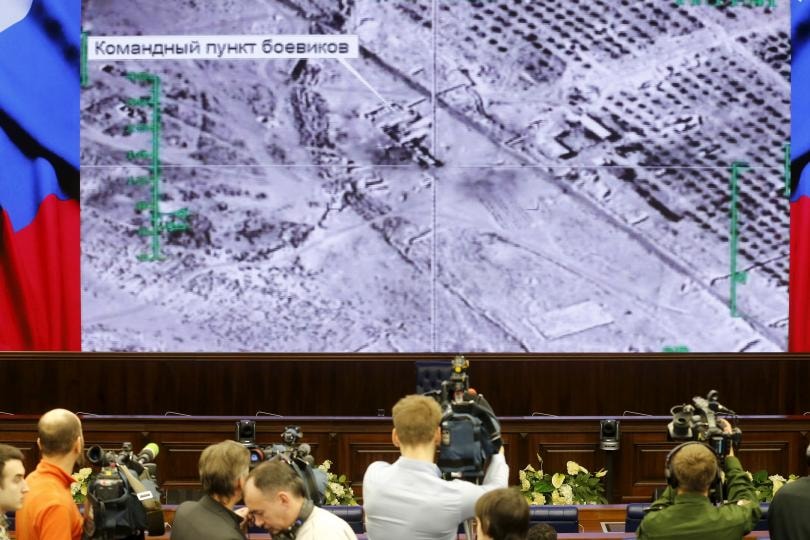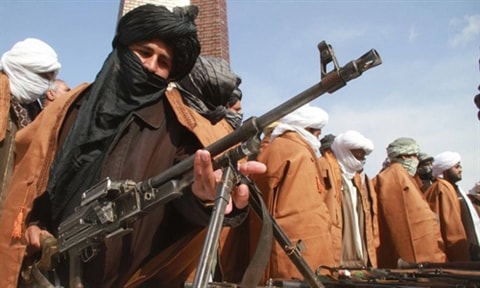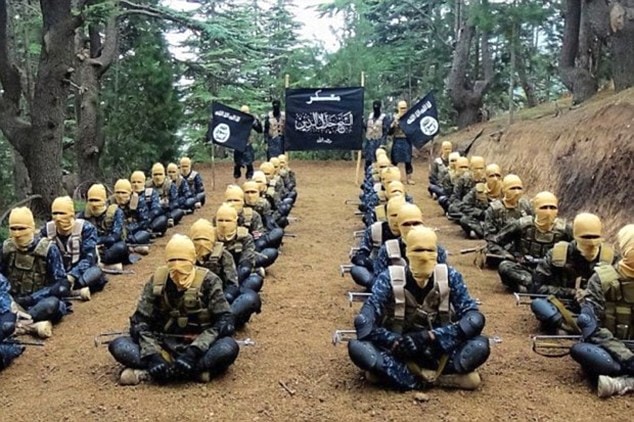Russia's alliance with the Taliban: Reckless or far-sighted?
(Baonghean) - In a sign that Russia is expanding its fight against the self-proclaimed Islamic State (IS) group to Central Asia, the government is considering opening communication channels with the Taliban insurgent group to exchange information. This is a surprising move that raises questions about the purpose and effectiveness of this step by Russia.
puzzling move
 |
| Press conference at the Russian Defense Ministry (December 25) announcing airstrikes against IS in Syria. Photo: Reuters. |
The recent announcement by the Russian Foreign Ministry that it intends to exchange intelligence with the Taliban in Afghanistan to fight IS has surprised and left both the military and observers skeptical. The Taliban is still an “enemy” on Russia’s list of terrorist organizations and Moscow considers the group an armed force that specializes in spreading instability and terror. Similar to IS, the Taliban is notorious for brutal executions and imposing harsh Islamic law in areas it controls. More dangerously, the Taliban currently controls some areas of Afghanistan near the border with Tajikistan, a former part of the Soviet Union and currently an ally of Russia.
So why is Russia allying with the “enemy”? According to Russian officials, objectively, Russia and the Taliban are both interested in the fight against the IS group. The Taliban in Afghanistan as well as the Taliban in Pakistan have declared that they do not recognize IS leader Al-Baghdadi as “caliph,” nor do they recognize this insurgent group. And so, both Russia and the Taliban have a common goal of destroying IS. However, this is only the “surface”. According to experts, the new intention is a bold choice of “fighting fire with fire” and being one step ahead of the Kremlin in the fight against terrorism.
In fact, the expansion of IS in the region has long been evident as they bribe and entice other jihadist groups such as Boko Haram or al-Qaeda. They have not yet attracted the Taliban, but who can guarantee that the two notorious terrorist groups will not annex each other? Last month, the US military warned that IS is increasing its presence in Afghanistan and has about 3,000 fighters there. A report by the US Department of Defense said that IS's branch in Afghanistan is openly clashing with the Taliban to compete for territory. In recent times, Russian President Vladimir Putin has repeatedly expressed concern about the risk of extremists from the Caucasus and former Soviet countries going to Syria to join IS.
 |
| Taliban insurgents in Afghanistan. Photo: Reuters. |
If the Taliban is annexed by IS or the Taliban actively siding with IS, Afghanistan, Pakistan and other Taliban areas will soon become new IS battlefields, no different from Iraq or Syria today. Once firmly established in this region, IS can extend its tentacles to its two neighbors, Tajikistan and Turkmenistan, opening the door for extremist Muslims to infiltrate Russia and carry out flank attacks, something that Moscow has been very concerned about since it launched its military intervention in Syria. Thus, linking up with the Taliban will be a proactive way to prevent IS from spreading closer to Russian territory.
In addition, many experts believe that Russia's strategy is also to "score points" with neighboring allies in Central Asia of the former Soviet Union. Russia's information connection with the Taliban may be a way for the Kremlin to assure its allies that intelligence information about IS will be held by Russia and shared with them. This is a strong restoration of relations and strengthening of trust with the Central Asian republics, competing with the US in the fight against IS in Afghanistan.
Potential danger
 |
| IS is believed to be expanding its territory into Afghanistan. Photo: DailyMail. |
However, Russia's strategy has also made analysts skeptical and believe that this move is somewhat reckless. The tactic of "fighting poison with poison" or "using enemies to fight enemies" has been used by the US and the West in wars. Recently, a British MP accused the US and the UK of giving birth to al-Qaeda and the Taliban. These organizations were created by the US and the UK, provided with money and weapons to fight the Soviet Union in the 1980s. But the use of terrorists as weapons against the enemy caused the US to suffer the consequences of being attacked by its own "children". The US and its allies then paid a very high price in a war that cost more than 10 years of people and money in Afghanistan to eliminate the Taliban, but in the end they could not "uproot the grass completely".
Not to mention the accusations that IS is also a “product” of the US and the West when created to overthrow the regime of Syrian President Bashar al-Assad. And now, the US and the West are having a headache trying to “eliminate” the product they created with tens of thousands of airstrikes that have yet to be effective.
Therefore, Russia's move reminds people of the old scenarios that the US has experienced and may repeat when the tactic of "using enemies to fight enemies" is not only bold but also causes the consequence of "hitting oneself with one's own petard". As a way to reassure public opinion, Russia said that it will not support the Taliban and that cooperation is only within the framework of the fight against IS. All of Russia's actions in the region are carried out on the basis of careful consideration so as not to affect the territorial integrity and security of countries. It seems that Russia's new intention is a wise choice or a risk, which is still an open question depending on Moscow's handling and response.
Thanh Huyen
| RELATED NEWS |
|---|
